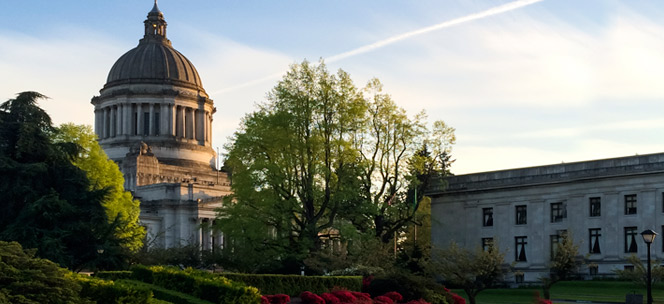US election subplot important for Manitoba's carbon tax debate

There are fascinating subplots within every epic event and beneath the clash of Donald and Hillary, a little-discussed referendum campaign provides important lessons for Manitoba. (Photo Washington State Capital building)
Ballots in Washington state included a simple question regarding a specific policy.
“Initiative Measure No. 732 concerns taxes. This measure would impose a carbon emission tax on certain fossil fuels and fossil-fuel-generated electricity, reduce the sales tax by one percentage point and increase a low-income exemption, and reduce certain manufacturing taxes. Should this measure be enacted into law?”
More than 58 per cent voted no.
Had voters supported a carbon tax, it would have imposed a charge of $15 per metric tonne of carbon emissions starting next summer and that would then rise to $100 per metric tonne over time. (For perspective, British Columbia’s carbon tax is currently $30 per tonne and translates to a 6.7 cent per litre gasoline tax). The revenues would have been used to cut other taxes.
For those tempted to indulge in stereotypes, it’s important to understand Washington state. More than 56 per cent voted for Hillary Clinton. During the primaries, Bernie Sanders carried the state with nearly 73 per cent. On other referendum questions, Washington voters cast ballots in favour of raising the minimum wage and allowing some restrictions on firearm ownership. Trump voters may get the credit and blame for many things, but they weren’t the ones who stopped Washington state’s carbon tax.
Washington’s rejection of a carbon tax isn’t only remarkable due to its political characteristics. Washington gets most of its electricity from emission-free hydro, nuclear and even wind power. It’s a national leader in driving hybrids and electric cars. Washington has a large oil refining industry, but it ranks down at 26th among the states for carbon emissions.
And no, big oil didn’t buy this vote. The Yes side reportedly raised $1.4 million while the No side raised just $386,922. In fact, the Washington State Labor Council, a local affiliate of the AFL-CIO, was a driving force against the carbon tax initiative.
“We need to get climate policy right,” explained the no-side on the referendum website. “This accelerating carbon tax will only push jobs and businesses elsewhere, and will not significantly address climate change.”
Washington and Manitoba have a lot in common and Premier Brian Pallister needs to pay attention to this carbon-tax referendum result.
Premier Pallister made two key promises in the last election. He promised to develop a made-in-Manitoba climate change policy and he also promised to give Manitobans the “right to vote on major tax increases.”
Even if it’s packaged with other tax cuts, a carbon tax would clearly qualify as a major tax increase for thousands of Manitobans and they have an undeniable right to have their say at the ballot box. Even if it’s implemented by the federal government and the revenues flow back to the province, Premier Pallister must honour his promise to let Manitobans vote and Prime Minister Justin Trudeau can take responsibility for accepting or ignoring the will of the people.
Former NDP Premier Greg Selinger promised not to raise taxes, but then hiked the PST and tried to persuade taxpayers it was a sound decision. He clearly believed the legally required referendum was unnecessary. Instead, voters emphatically tossed him from office.
Premier Pallister must carefully consider the cautionary tale presented by Washington state’s overwhelming rejection of a carbon tax. If the presidential election has presented any coherent message, it’s a jarring reminder that this is a perilous time for politicians who assume to know the minds of their voters. Premier Pallister risks sharing his predecessor’s fate if he fails to hold a referendum prior to implementing a carbon tax.